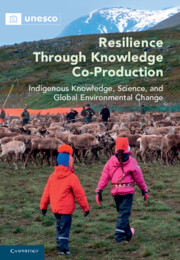 Resilience through Knowledge Co-Production
Resilience through Knowledge Co-Production Book contents
- Resilience through Knowledge Co-production
- Resilience through Knowledge Co-production
- Copyright page
- Contents
- Contributors
- Acknowledgements
- Introduction
- Part I From Practice to Principles
- Part II Indigenous Perspectives on Environmental Change
- Part III Global Change and Indigenous Responses
- Epilogue
- 17 Negotiating Co-production: Climbing the Learning Curve
- Index
- References
17 - Negotiating Co-production: Climbing the Learning Curve
from Epilogue
Published online by Cambridge University Press: 02 June 2022
- Resilience through Knowledge Co-production
- Resilience through Knowledge Co-production
- Copyright page
- Contents
- Contributors
- Acknowledgements
- Introduction
- Part I From Practice to Principles
- Part II Indigenous Perspectives on Environmental Change
- Part III Global Change and Indigenous Responses
- Epilogue
- 17 Negotiating Co-production: Climbing the Learning Curve
- Index
- References
Summary
The Epilogue summarizes some key general principles to guide the knowledge co-production process as outlined in the Introduction and individual chapters in the book. To create the new intellectual space for rethinking co-production, it is important to view it as a special path, quite different from the previous agenda of documenting Indigenous people’s knowledge for environmental, management and climate mitigation purposes. Its guiding definition is co-production, as being repeatedly argued by Indigenous constituencies worldwide. The Epilogue also addresses the issues of geographic, cultural and historical inequalities in practising co-production and in the acceptance (inclusion) of its outcomes by agencies, governments and academic science. In the early 21st century, knowledge co-production remains an actively ‘negotiated’ process, whose emerging parameters are to influence its eventual application and outcomes.
Keywords
- Type
- Chapter
- Information
- Resilience through Knowledge Co-ProductionIndigenous Knowledge, Science, and Global Environmental Change, pp. 277 - 286Publisher: Cambridge University PressPrint publication year: 2022


